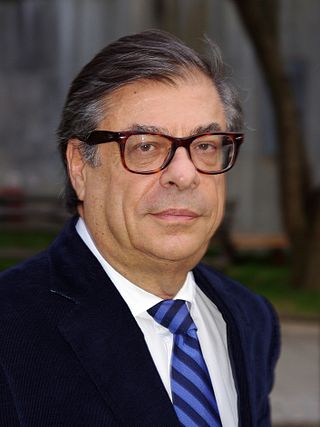Bob Colacello
American writer (born 1947) From Wikipedia, the free encyclopedia
Bob Colacello (born May 8, 1947) is an American writer. He began his career writing for The Village Voice before becoming the editor-in-chief of pop artist Andy Warhol's Interview magazine from 1971 to 1972 and from 1974 to 1983.[1][2] As part of Warhol's entourage, they collaborated on the books The Philosophy of Andy Warhol (1975) and Exposures (1979). Since 1984, Colacello has been a contributing editor for Vanity Fair, and since 1993, he has served as a special correspondent.[3]
Bob Colacello | |
|---|---|
 Colacello at the 2011 Tribeca Film Festival Vanity Fair party | |
| Born | Robert Colaciello May 8, 1947 Bensonhurst, New York, U.S. |
| Education | Georgetown University Columbia University |
| Occupation | Writer |
Life and career
Summarize
Perspective
Robert Colaciello was born to John and Libby Colaciello in Bensonhurst, New York on May 8, 1947.[4] He and his two sisters, Barbara and Suzanne, were raised in Plainview, Long Island.[5] He graduated from the Edmund A. Walsh School of Foreign Service at Georgetown University in 1969, and also has an MFA degree in film criticism from Columbia University Graduate School of the Arts.[6]
Colacello began his writing career around 1969, when he began publishing film reviews in the Village Voice weekly.[7] As a graduate student in the Film department at Columbia University in New York, his first publications doubled as his class essays and homework assignments.[8]
In 1970, Colacello wrote a review of Andy Warhol's film Trash, which he hailed as a "great Roman Catholic masterpiece". This review garnered the attention of Warhol, and Paul Morrissey, the director of many of Warhol's films, who approached Colacello to write for Interview magazine, a new film review magazine Warhol had recently begun to publish.[9] Colacello was made editor of Interview within six months and, for the next 12 years, remained directly involved in all aspects of life and business at The Factory— Warhol's studio—as he developed the magazine into one of the best-known lifestyle magazines of the time.[8] Early on, he still wrote his name as Robert Colaciello.[10] Colacello recalled that Warhol suggested he change his name to Bob Cola, in order to sound more "pop."[11]
From the spring of 1972 to the summer of 1973, Glenn O'Brien took over as managing editor of Interview, replacing Colacello.[10] After O'Brien left for Rolling Stone magazine, Rosemary Kent, an editor from WWD magazine, was the managing editor from 1973 to 1974 until Colacello took over once again.[1]
Interview underwent a revamp and became a reflection of Warhol's social life. In 1974, Colacello began writing his "Out" column: "Andy said, just write about everywhere you go, every lunch, every dinner, every art opening, every movie premiere, every person you see there, whether they're famous or not. And then everyone mentioned will have to go out and buy the magazine and tell ten friends—'I'm in Interview, you have to buy it.' That was the idea for my column. It was very tongue-in-cheek."[5]
In addition to writing for Interview, Colacello traveled with Warhol, attending parties and events with the task of asking celebrities, socialites, heads of state, and princesses if they wanted their portraits commissioned by Warhol.[10] They also collaborated on the books The Philosophy of Andy Warhol (1975) and Exposures (1979).
For a time Colacello lived with a boyfriend, Kevin Farley, who worked at Iolas Gallery in New York.[12]
In 1983, Colacello left Interview due to tensions with Warhol. He cited not receiving credit for books he ghostwrote, and Warhol's jealousy over the attention Colacello received from Nancy Reagan among the reasons for his departure.[13] According to Warhol: The Biography by Victor Bockris, Colacello and Warhol's relationship deteriorated partly because Colacello had been "trying to stake a claim to an inordinate share of control over Andy Warhol Enterprises."[14]
In 1984, Colacello began writing for Vanity Fair magazine,[15] and has been a regular contributor since, writing extended profiles on a wide range of public personalities, including Prince Charles and Camilla Parker Bowles,[16] Balthus,[17] Rudolf Nureyev,[15] Liza Minnelli,[18] Estée Lauder,[19] Doris Duke,[20] and Naomi Campbell.[21]
Colacello is also a biographer. He is the author of Ronnie and Nancy: Their Path to the White House, 1911-1980, about the social and political rise of Ronald Reagan and his wife Nancy Reagan.[22] His memoir of working with Andy Warhol, titled Holy Terror: Andy Warhol Close Up (1990),[23] was called the "best-written and the most killingly observed" book on the subject by The New York Times.[24]
In 2007, a book of Colacello's photographs titled Bob Colacello's Out was published in 2007.[25]
In 2022, Colacello appeared in the Netflix documentary series The Andy Warhol Diaries.[26]
Books
- Colacello, Bob. Ronnie & Nancy: Their Path to the White House, 1911 to 1980. Warner Books, 2004
- Colacello, Bob. Bob Colacello's Out. New York: 7L, 2007
- Colacello, Bob. Holy Terror: Andy Warhol Close Up. New York, New York: HarperCollins. Vintage reprint edition, March 11, 2014
Awards
- 2017 Paez Medal of Art, New York City (VAEA).[27]
Notes
Wikiwand - on
Seamless Wikipedia browsing. On steroids.
